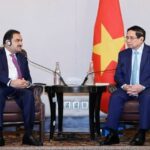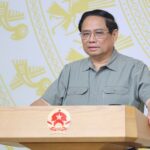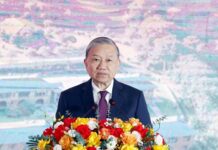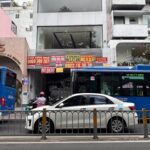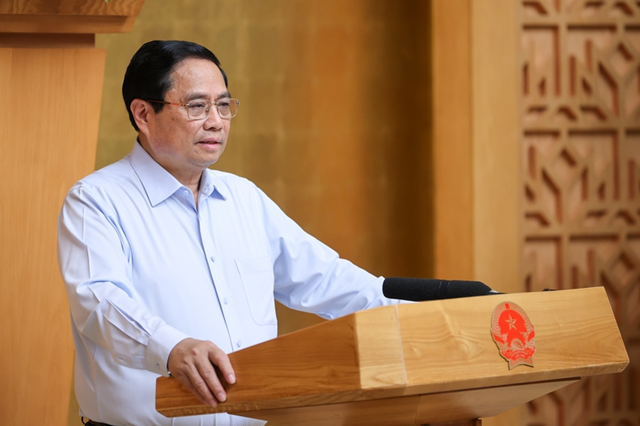
Prime Minister Pham Minh Chinh concludes the September 2024 Government meeting on law-making – Photo: VGP/Nhat Bac
|
On September 14, Prime Minister Pham Minh Chinh chaired a Government meeting on law-making, considering and approving three draft laws and two proposals for law-making.
The meeting was attended by Deputy Prime Ministers Nguyen Hoa Binh, Tran Hong Ha, Le Thanh Long, Bui Thanh Son, and Ho Duc Phoc; ministers, heads of ministerial-level agencies, Government agencies, and leaders of relevant ministries, sectors, and agencies.
The delegates discussed the dossiers, procedures, and principles of law-making, as well as the requirements and contents of the draft laws. For the proposals for law-making, they discussed the dossiers, procedures, necessity, principles, and requirements.
The best policies and regulations for the country will be resolutely implemented.
In the morning, the Government discussed two draft laws prepared by the Ministry of Planning and Investment: the Public Investment Law (amended) and the Law amending and supplementing a number of articles of the Law on Planning, Investment Law, PPPa>w, and Bidding Law.
It was assessed that the Public Investment Law (amended) has quite large and complex revisions, and the time for submission to the National Assembly at the 8th session is very urgent. The Government members requested that the Ministry of Planning and Investment make more efforts to ensure the completion of the Law project as regulated.
As for the Law amending and supplementing a number of articles of the Law on Planning, Investment Law, PPP Law, and Bidding Law, 65 clauses, items, and points of four Laws will be amended, supplemented, and repealed, including many regulations related to the authority and procedures in the fields of planning, investment, and bidding. The delegates agreed on the necessity of building this Law to immediately remove difficulties and obstacles and create favorable conditions for investment, production, and business activities, contributing to mobilizing all resources to promote growth.
Prime Minister Pham Minh Chinh emphasized some principles and requirements for building these Laws, requesting to review and closely follow the new orientations in the resolutions and conclusions of the Party to concretize them; putting the interests of the nation and the people first; doing what is most effective and best for the country; inheriting what is good and changing what is not good, always innovating; and resolutely doing what is right.
If the regulations are different from the current laws, it is necessary to determine the principles of law application clearly to ensure unity in the implementation process. At the same time, it is necessary to assign the right person for the job, with clear tasks and good coordination among agencies. The amendments and supplements need to be fully explained and justified with data and arguments to ensure persuasiveness for the competent authorities.
Promote decentralization and delegation of power, along with resource allocation, improvement of implementation capacity, and enhancement of the responsibility of the heads of agencies. Simplify and cut down cumbersome and troublesome procedures for people, businesses, and agencies at all levels; resolutely eliminate the “asking – giving” mechanism and the environment that gives rise to corruption, negativity, and easy violation, leading to mistakes and loss of officials; and shorten the implementation time to soon complete and put the public investment project into operation.
Remove difficulties and obstacles in reality and mobilize the management capacity and resources of all economic components in implementing public investment projects, with public investment leading and activating private investment. Do not spread ODA sources but focus on a number of large and key projects that can change the situation and state.
Supplement mechanisms and tools to evaluate the effectiveness of work, as well as supervision, inspection, and urging to implement rewards and discipline clearly in the implementation of public investment.
The Prime Minister assigned Deputy Prime Minister Nguyen Hoa Binh to continue directing, and the Ministry of Planning and Investment to continue synthesizing the opinions of agencies, organizations, and individuals to complete the Law project; concentrate resources to speed up the progress, and closely coordinate with the Government Office, the Ministry of Justice, and relevant ministries to explain and absorb the opinions of Government members, ensuring quality and progress, and submitting it to the National Assembly at the 8th session.
Reduce regular expenditures and focus on development investment
In the afternoon, the Government discussed and gave opinions on the draft law amending and supplementing a number of articles under the management of the Ministry of Finance and two proposals for law-making.
The draft law prepared by the Ministry of Finance is the Law amending and supplementing a number of articles of the Law on State Budget, Law on Management and Use of Public Assets, Law on National Reserves, Accounting Law, Independent Audit Law, Securities Law, and Tax Administration Law.
The delegates highly appreciated the active research and coordination of the Ministry of Finance with ministries, sectors, and localities in summarizing reality and building new policies to complete the Law project with full dossiers and procedures as prescribed.
Regarding the principles and requirements for building the Law, Prime Minister Pham Minh Chinh requested to focus on thoroughly handling bottlenecks and problems in reality, promptly removing difficulties for production and business activities, encouraging and mobilizing resources of the State and society effectively, and improving the investment and business environment to promote development in the new context.
Regarding the amendment of the State Budget Law and the amendment and supplement of the Tax Administration Law, the Prime Minister emphasized the orientation of increasing revenue, expanding the tax base, collecting the right, sufficient, and timely taxes; spending efficiently, reducing regular expenditures, and focusing on development investment. The rate of increase in development investment expenditure must be higher than that of regular expenditure; ensuring flexibility in the use of the state budget; promoting tax collection with e-commerce, fast tax refund…
Regarding the amendment of the Securities Law, the Ministry of Finance should carefully review the regulations to create a favorable trading market and effective management by state agencies. For the Accounting Law, the Ministry of Finance needs to be cautious in clarifying the principles of applying accounting standards for the convenience of enterprises and management agencies…
Regarding the amendment and supplement of the Law on Management and Use of Public Assets, it is necessary to remove legal bottlenecks to promote public-private cooperation, and increase the forms of “public investment, private management” such as stadiums, museums, guest houses…, “private investment, public use” such as offices…, and “public leadership, private management” with export processing zones, industrial parks, and high-tech parks… Regarding the amendment of the National Reserve Law, it is necessary to ensure appropriate, flexible, convenient, and timely reserves in the process of implementing reserve withdrawal for urgent situations.
The Prime Minister assigned Deputy Prime Minister Ho Duc Phoc to direct, and the Ministry of Finance to coordinate with relevant ministries and agencies to absorb the opinions of the Government and the Government members at the meeting, and promptly complete the Law project to submit to the National Assembly at the 8th session.
Decentralization and delegation of authority in law-making
Regarding the proposal for building the Law on Promulgation of Legal Documents (amended), chaired by the Ministry of Justice, the delegates agreed on the necessity of amending and supplementing the Law to improve the law-making process; remove difficulties and obstacles in the work of building and promulgating legal documents in the past time; and meet the increasing demands and requirements for the progress and quality of institution-building, especially in promptly proposing and promulgating legal documents to handle urgent and emerging issues.
The delegates focused on discussing the policies in the proposal for building the Law: strengthening the leadership of Party committees at all levels, supplementing a number of principles on controlling power in the making and enforcement of legal documents; clearly defining the authority to promulgate legal documents; continuing to innovate and perfect the process of building legal documents in a professional and scientific manner, and promptly responding to policies; clearly defining the roles, authority, and responsibilities of the subjects participating in the making and promulgation of legal documents; continuing to improve a number of regulations on the organization of enforcement of legal documents; strengthening inspection and handling of legal documents that violate the law; ensuring resources and innovating mechanisms for allocating and using funds effectively for law-making and enforcement.
Along with the common principles and requirements, the Prime Minister noted some contents in the process of building this Law, requesting to institutionalize the guidelines and policies of the Party on law-making in a timely and full manner.
The Prime Minister emphasized that what is mature, clear, and proven effective in reality, with the consensus of the majority, should continue to be implemented and legalized. For new and unclear issues, it is necessary to boldly pilot, learn from experience, and gradually expand, without being perfectionist or hasty. For issues that are still in flux, not clear, or urgent and specific issues that need to be handled within a narrow scope and short time, it is proposed to assign the Government to regulate and guide according to the actual situation, ensuring flexibility and appropriateness.
Strengthen decentralization and delegation of authority in law-making, in conjunction with enhancing the responsibility of the heads of agencies; cut down cumbersome and unnecessary procedures that slow down the drafting and promulgation of legal documents.
The Prime Minister assigned Deputy Prime Minister Le Thanh Long to direct, and the Ministry of Justice to maximize the absorption of the opinions of Government members and those at the Government meeting, and promptly coordinate with relevant ministries and agencies to research and complete the dossier of the proposal for building the Law, submitting it to the National Assembly and the Standing Committee of the National Assembly according to regulations.
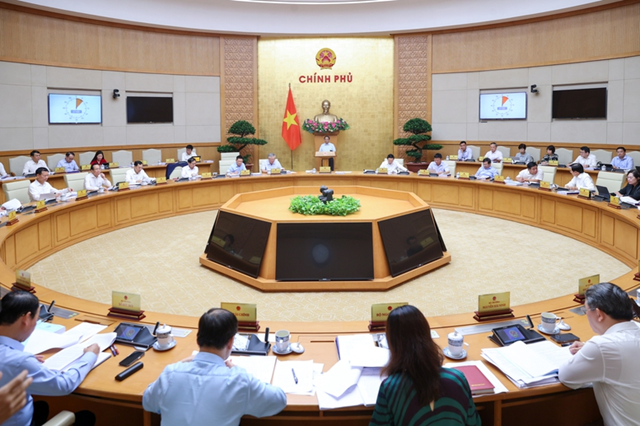
The Prime Minister requested that the issuance of documents detailing and guiding the implementation of laws and ordinances be timely to avoid legal gaps – Photo: VGP/Nhat Bac
|
Create favorable conditions for press agencies to strengthen their potential and material foundations
Regarding the proposal for building the Press Law (amended), chaired by the Ministry of Information and Communications, the delegates discussed the proposed policies related to strengthening the management of press activities; improving the quality of journalists and leaders of press agencies; promoting the development of the press economy; and regulating press activities in cyberspace…
Regarding the principles and requirements for building the Law, the Prime Minister emphasized the need to closely follow and institutionalize the guidelines and policies of the Party on press management and development; amend and supplement the provisions of the current Press Law to overcome difficulties and shortcomings and ensure practicality; promote the development of the press in line with the reality and the trend of press digitization, while maintaining the nature and promoting the role of revolutionary press; and improve professional and modern press agencies, taking the lead and orienting social opinion.
The goal is to build key and multi-media press agencies to effectively serve the interests of the nation and the people; improve the quality of journalists and leaders of press agencies; promote press digitization; build mechanisms and policies to ensure that press agencies fulfill their political tasks assigned by the Party and the State in information and propaganda work, protect the ideological foundation of the Party; and encourage and create favorable conditions for press agencies to strengthen their potential and material foundations, with legitimate and rightful additional income for press agencies and journalists; and timely reward and discipline.
The Prime Minister assigned Deputy Prime Minister Ho Duc Phoc to direct the completion of the proposal for building this Law; the Ministry of Information and Communications to coordinate with the Ministry of Justice, the Government Office, and relevant agencies to research and complete the policies in the proposal for building the Law; and the Minister of Justice, on behalf of the Prime Minister, to report to the Standing Committee of the National Assembly on adding the proposal for building the Press Law (amended) to the law and ordinance-making program in 2025.
Manage closely and promote development
Concluding the meeting, Prime Minister Pham Minh Chinh appreciated that after a day of urgent and enthusiastic working with a high sense of responsibility, the Government had completed five important contents. He highly appreciated the efforts and active preparation of the Ministry of Justice and the ministries in charge of the contents, and requested the ministers to seriously and fully absorb the reasonable opinions of the Government members and delegates, and complete the proposals and draft laws according to regulations, ensuring progress and quality.
Regarding the key tasks in institution-building in the coming time, the Prime Minister said that the workload is very large due to the requirements of reality, while a lot of time and effort must be spent on many other important tasks. At the 8th session, the Government is expected to submit 15 draft laws to the National Assembly for approval and 10 draft laws for comments.
The Prime Minister requested to continue promoting the spirit of serving the people, doing better and better, and living up to the trust and expectations of the Party, State, and people. He requested that the ministers and heads of ministerial-level agencies prioritize their time and focus their resources on directly leading and directing the completion of the draft laws for submission to the National Assembly according to regulations; closely coordinate with the agencies of the National Assembly to create consensus in the process of verifying, explaining, and absorbing the opinions of the Standing Committee of the National Assembly and deputies; and continue to get opinions from experts, scientists, and practitioners…
The Prime Minister said that in the process of building and perfecting the draft Laws, it is necessary to strengthen the leadership of the Party in law-making; renew the thinking of law-making, in the direction of both managing closely and promoting development, mobilizing resources, and creating a new development space for the country in the new period.
Law-making must start from reality, respect reality, closely follow reality, and take reality as a measure; take the people and businesses as the center and subject, and all policies must be oriented to the people and businesses, encouraging the people, businesses, and related subjects to participate in contributing to law-making and perfection.
The goal is to mobilize and use resources effectively, with the view that resources come from thinking, motivation comes from innovation, and strength comes from the people; focusing on renewing traditional growth drivers and promoting new ones.
The Prime Minister stated that the preparation of the draft Laws should be done in the shortest possible time to meet the rapid changes and urgent requirements of reality; resolutely remove legal obstacles in reality and present and argue convincingly to create consensus in society, among the people, businesses, and functional agencies.
At the same time, the regulations should be clear but not rigid; strengthen thorough decentralization and delegation of authority, while effectively mobilizing and allocating resources, improving implementation capacity, and designing tools to strengthen supervision, inspection, and control of power.
Along with that, simplify and cut down administrative procedures to reduce costs for businesses and improve the investment and business environment; eliminate the “asking – giving” mechanism and reduce intermediate steps. Control power and do not let the installation of regulations on group interests, local interests, or the creation of an environment for corruption, negativity, or violation occur in the draft Laws.
The Prime Minister requested that the issuance of documents detailing and guiding the implementation of laws and ordinances be timely to avoid legal gaps and obstacles that cause difficulties for localities, businesses, and people, affecting the effectiveness of the law due to the slow issuance of documents detailing the implementation of laws. The Minister of Justice shall monitor, urge, and inspect the issuance of documents detailing the implementation of laws by ministries, ministerial-level agencies, and localities, and the situation of law enforcement.
Unveiling the Billionaire Benefactor: A Million-Dollar Aid for Vietnam to Overcome Devastating Floods
Gautam Adani, the Indian billionaire and founder of the Adani Group, has donated $1 million to Vietnam for flood relief efforts. This generous gesture is just one example of Adani’s remarkable journey from a humble employee in a diamond company to becoming one of Asia’s richest and most influential businessmen.
Unlocking Rapid and Comprehensive Development: Da Nang’s 3 Pioneering Breakthroughs
Danang City is embarking on a journey of 3 pioneering breakthroughs, taking the lead to forge a path towards rapid, holistic, harmonious, and sustainable development in the years to come.
The Prime Minister’s Agenda: 6 Key Tasks and Solutions in the Wake of a Historic ‘Superstorm’
Prime Minister Requests Immediate Action with Six Key Tasks: In the wake of the devastating historical superstorm Yagi, the Prime Minister has instructed the government to issue a resolution outlining six critical tasks to be undertaken. These tasks include immediate relief efforts, stabilizing the situation for the people, rebuilding and restoring businesses, controlling inflation, and promoting economic growth.
“Unveiling the Secrets of a High-Tech Project: A Proposal for a Revolutionary Approach”
The Ministry of Planning and Investment has proposed a special investment procedure for high-tech projects, with a swift 15-day approval process. This bold move aims to foster innovation and attract cutting-edge technology ventures to the country. By streamlining the investment process, the Ministry seeks to create a dynamic and conducive environment for high-tech enterprises, accelerating their growth and contribution to Vietnam’s economic development.

